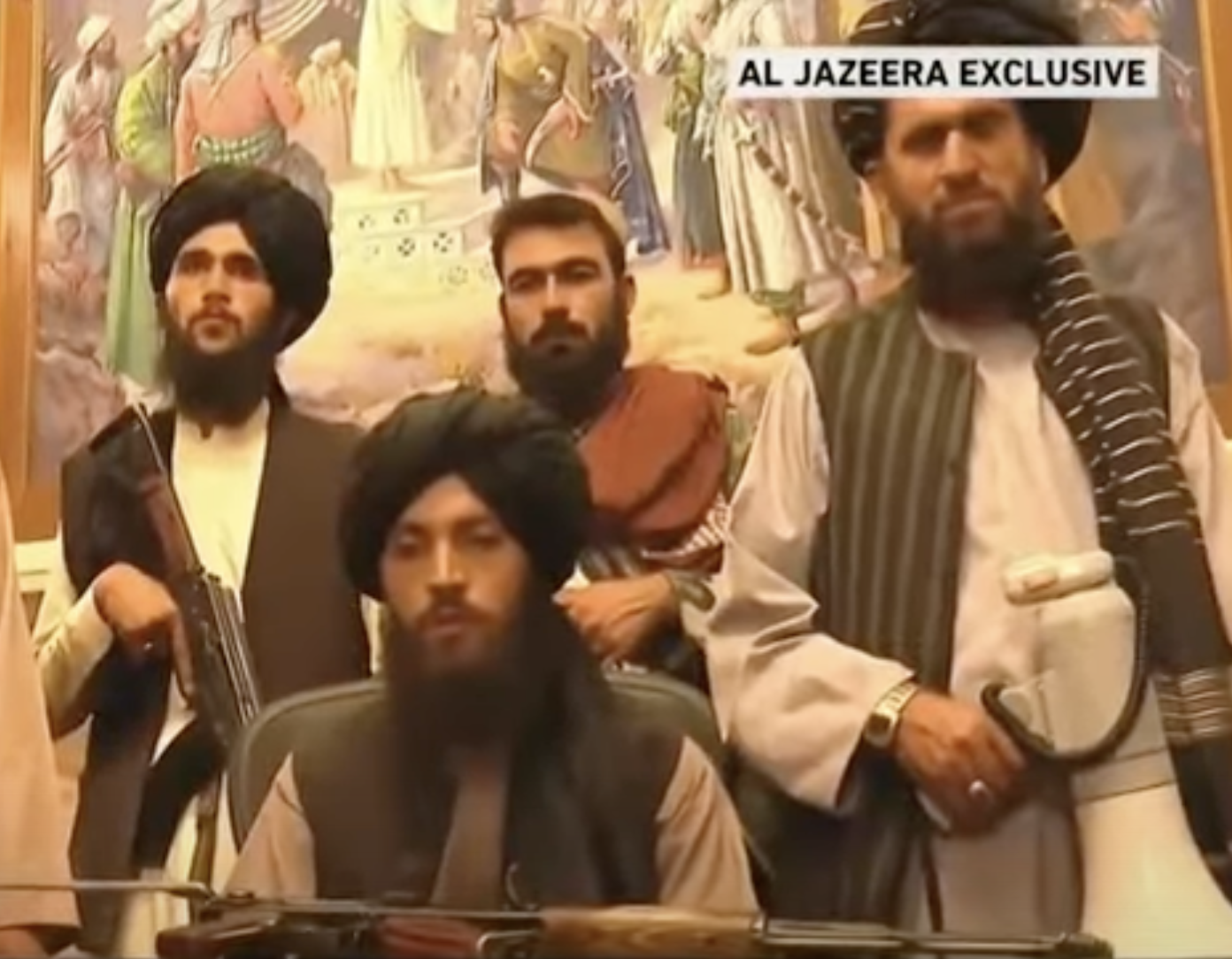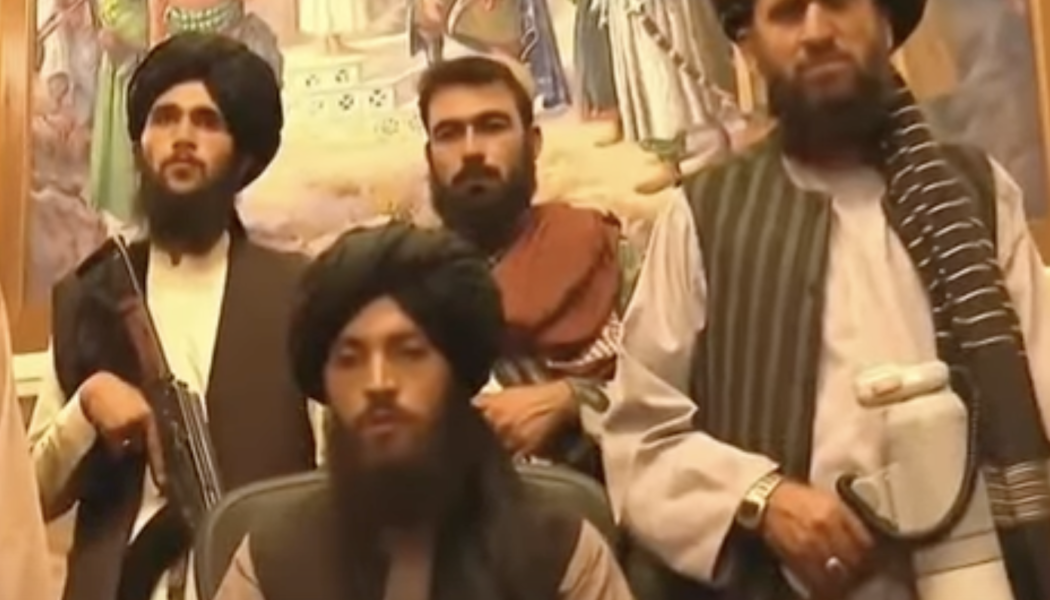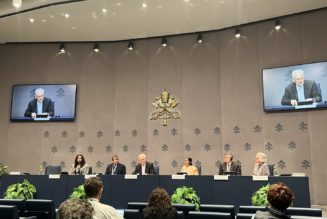
The whole idea of Axios, as a news publication, is to take massive, complex stories and — using a combination of bullet lists and URLs to additional information — allow readers to quickly scan through the news of the previous day. The Axios team calls this “smart brevity.”
More often than not, this turns out to be a crunched summary of the big ideas in mainstream coverage. Thus, it’s logical to look at this online newsletter’s take — “1 big thing: System failure” — on the horrific scenes that unfolded yesterday in Kabul, Afghanistan.
The big question: What did American diplomats, intellectuals and politicos miss in the big picture?
* The United States was literally run out of town after 20 years, $1 trillion and 2,448 service members’ lives lost.
* Mohammad Naeem, the spokesman for the Taliban’s political office, told Al Jazeera today: “Thanks to God, the war is over in the country.”
Why it matters: A friend who spent more than a decade as a U.S. official in Afghanistan and Iraq texted me that the collapse “shows we missed something fundamental — something systemic in our intel, military and diplomatic service over the decades — deeper than a single (horrible) decision.”
* As the BBC’s Jon Sopel put it: “America’s attempt to export liberal democracy to Afghanistan is well and truly over. …”
What were the key tasks in this “export of liberal democracy”? Here is my two-point summary.
First, the United States and its allies had to build an Afghan military that could protect this project. #FAIL
Second, the Western nation builders had to sell a vision of an Islamic culture that, somehow, embraced American values on a host of different issues — from free elections to freedom for women, from Western-style education to respect for the Sexual Revolution in all its forms. This Georgetown University faculty lounge vision of Islam needed to be more compelling than the one offered by the Taliban. #FAIL
Looking at this from a journalism perspective, I think it is more than symbolic that most of the elite media coverage of the fall of this new, alternative Afghanistan have almost nothing to say about Islam and, in particular, the divisions inside that stunningly complex world religion. Was this, in any way, a “religion story”? Apparently not. #FAIL
There is way too much coverage to look at, of course. However, it does help to look at The New York Times, since that is the straw that stirs the drink in American media. My goal was to find material that contrasted the Taliban’s vision of Islam with the vision offered by the U.S. State Department.
Here is a typical summary passage, from a Times report with this headline: “Rushed Evacuation in Kabul Highlights Disconnect in Washington.”
In the end, even the evacuation of what one Defense Department official estimated could be 20,000 Americans and an untold number of Afghans somehow managed to reflect the story of the entire 20-year war: a disconnect between American diplomats and the reality on the ground.
That disconnect has been clear as a series of administrations presented a succession of optimistic prognoses: The Taliban were in retreat, the Afghan military was on the brink of assuming control of the country, and the government in Kabul was one step away from being able to provide security across the land. In the last four months, as U.S. troops packed up and left the country under orders from President Biden, administration officials said the staff at the American Embassy in Kabul and State Department headquarters in Washington hung on to hope that their presence in the country could instill some backbone in the Afghan government.
That didn’t happen.
With that in mind, I will restate my question: Did clashing visions of Islam and the shape of an Islamic culture have anything to do with this “disconnect” between Western values and the “reality on the ground”?
<div class="sqs-block embed-block sqs-block-embed" data-block-json="{"hSize":null,"floatDir":null,"url":"https://twitter.com/USEmbassyKabul/status/1400060130243362816","html":"
The month of June is recognized as (LGBTI) Pride Month. The United States respects the dignity & equality of LGBTI people & celebrates their contributions to the society. We remain committed to supporting civil rights of minorities, including LGBTI persons. #Pride2021 #PrideMonth pic.twitter.com/qgKPQAPaOY
— U.S. Embassy Kabul (@USEmbassyKabul) June 2, 2021
\n","width":550,"height":null,"resolvedBy":"twitter","providerName":"Twitter"}” data-block-type=”22″ id=”block-yui_3_17_2_1_1629119844858_19602″>
The month of June is recognized as (LGBTI) Pride Month. The United States respects the dignity & equality of LGBTI people & celebrates their contributions to the society. We remain committed to supporting civil rights of minorities, including LGBTI persons. #Pride2021 #PrideMonth pic.twitter.com/qgKPQAPaOY
— U.S. Embassy Kabul (@USEmbassyKabul) June 2, 2021
If you are looking for material about religious issues, the one place you can find it is in news-media discussions of the Taliban’s approach to the Islamic laws that shape the life of women. It is safe to assume that, sooner rather than later, the Times team will find a way to source news stories about LGBTQ issues after the fall.
Here is a typical passage, from a story with this headline drawn from the “Live Updates” on the Times website: “Afghan women fear what will happen with the Taliban once again in power.”
Over two decades, the American mission evolved from hunting terrorists to helping the government build the institutions of a functioning government, dismantle the Taliban and empower women. But the U.S. and Afghan militaries were never able to effectively destroy the Taliban, who sought refuge in Pakistan, allowing the insurgents to stage a comeback.
The Taliban never recognized Afghanistan’s democratic government. And they appear closer than ever to achieving the goal of their insurgency: to return to power and establish a government based on their extremist view of Islam.
Here is the key: The Taliban has a “view of Islam.” However, it appears that, for the Times team and U.S. authorities, the nation-building project led by Western elites didn’t involve a competing “view of Islam.” Thus, there is little or no reason for the Gray Lady to discuss that.
You could see this “religion ghost” looming in the background during a crucial Times report about the collapse of the Afghan military.
In many ways, this story — “The Afghan Military Was Built Over 20 Years. How Did It Collapse So Quickly? — was the moment when reality reached A1.
The word “Islam” appears nowhere in this lengthy news feature. Religion, you see, plays no role in this drama (unless one listens to the victorious Taliban leaders). I thought this passage was especially interesting. Wait for the shoe to drop in the final sentence:
… (The) Afghan security forces have collapsed in more than 15 cities under the pressure of a Taliban advance that began in May. … The swift offensive has resulted in mass surrenders, captured helicopters and millions of dollars of American-supplied equipment paraded by the Taliban on grainy cellphone videos. In some cities, heavy fighting had been underway for weeks on their outskirts, but the Taliban ultimately overtook their defensive lines and then walked in with little or no resistance.
This implosion comes despite the United States having poured more than $83 billion in weapons, equipment and training into the country’s security forces over two decades.
Building the Afghan security apparatus was one of the key parts of the Obama administration’s strategy as it sought to find a way to hand over security and leave nearly a decade ago. These efforts produced an army modeled in the image of the United States’ military, an Afghan institution that was supposed to outlast the American war.
At this moment in time, what are some of the core values of U.S. military leaders? Would any of them — especially on matters of gender and sexuality — clash with centuries of Islamic traditions, especially when those teachings are interpreted by the Taliban?
This leads to one final summary statement:
… When the Taliban started building momentum after the United States’ announcement of withdrawal, it only increased the belief that fighting in the security forces — fighting for President Ashraf Ghani’s government — wasn’t worth dying for.
That’s all for now. Please help me look for mainstream coverage of what the Taliban leaders have to say about their victory and their plans for the land they have recaptured.
The big question: How quickly will Western journalists simply move on to another topic? Will news consumers have a chance to find out what happens to women, missionaries, religious minorities (including Muslim progressives), NGOs, sexual minorities and others at risk under Taliban rule?
FIRST IMAGE: Screenshot from NBC News coverage of the Taliban takeover in Kabul, using video from Al Jazeera.
Join Our Telegram Group : Salvation & Prosperity








